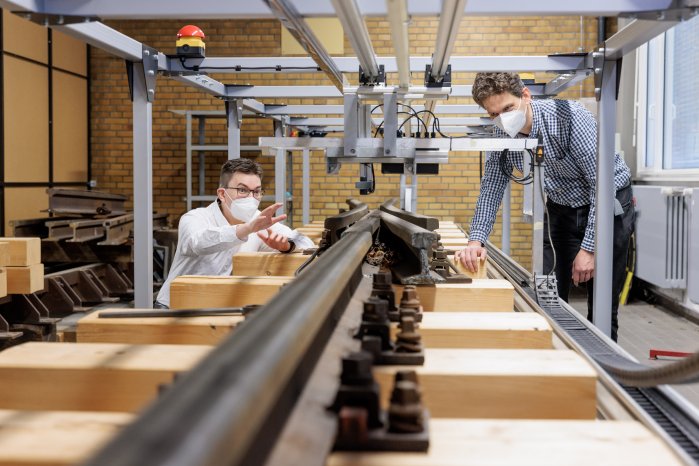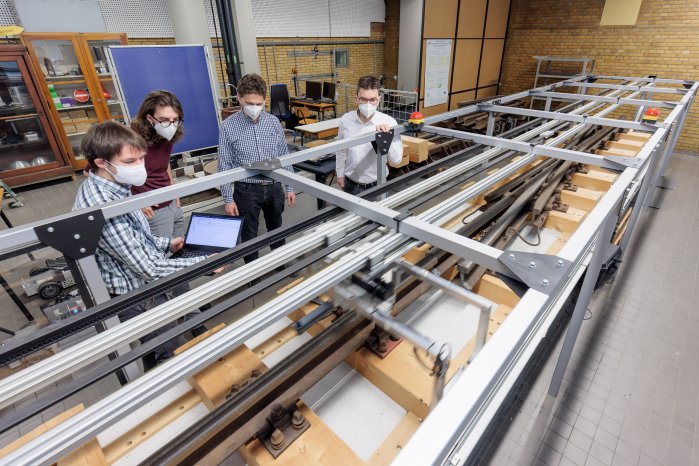Like all branches of industry, the mobility sector is keen to find a more climatefriendly way to go. Railway services are the answer to the question of greener mobility. Trains certainly run cleaner with just a third of cars’ and a mere sixth of planes’ greenhouse gas emissions per passenger kilometer.1
ITK Engineering and the Karlsruhe Institute of Technology (KIT) have developed an innovative sensor to give future railway capacity a big boost. This solution would enable today’s network to accommodate far more trains and make passenger and freight rail services even more efficient. It goes by the name of Magnetic Railway Onboard Sensor (MAROS). “We want to help make railway services even more efficient and continue to shrink the carbon footprint of passengers and freight,” says Dr. Tobias Hofbaur, Program Manager Railway Engineering at ITK Engineering. “Deployed across the board, it promises to improve railway network utilization by 35 percent.”
A sensor detects each rail section’s fingerprint
The way MAROS works is easily explained: A metal rail has a fingerprint of sorts – that is, a unique profile at each point. The sensor is able to detect exactly this fingerprint. “MAROS will enable trains to be located worldwide – continuously and track selective,” says Hofbaur.
“To this end, the sensor attached to the vehicle’s undercarriage generates an electromagnetic field that is affected by ferromagnetic materials such as rails and other track materials that hold rails in place,” says Dr. Martin Lauer from the KIT Institute of Measurement and Control Systems. “The sensor measures the extent to which the electromagnetic field changes. This serves to assign an exact electromagnetic fingerprint to each section of the track.”
Algorithms enable continuous and reliable train localization
Assigning this unique locational signature to an exact geographic position requires a software backend equipped with intelligent algorithms. Every stretch of the track has to be traveled and measured at least once before this data can be overlaid on maps of a given railway track. Then the railway operator will be able to localize precisely each subsequent train or send its measurement data to the backend for further analysis by the infrastructure provider.
ITK Engineering and KIT have been working on this ferromagnetic measuring tech since 2020. The Karlsruhe-based university’s mission was to deliver scientific evidence to corroborate that the technology works efficiently. ITK Engineering’s job was to build a prototype and the software backend. The company is now conducting trial runs and working to industrialize the technology.
ITK and KIT prioritized safety and availability during this collaboration. Their effort paid off: MAROS complies with CENELEC standards as well as with the highest safety integrity level SIL4. Beyond that, it offers highest precision and utmost reliability for ETCS Level 3, Automatic Train Operation (ATO) and Communication-Based Train Control (CBTC).
MAROS – more affordable, precise and reliable than the alternatives
MAROS steers clear of the drawbacks that plague systems currently deployed worldwide to determine train positions: Balises – that is, beacons installed in the track to send information – are reliable but expensive. Camera systems do not work as well at night or in snow. GPS signals can be compromised by tunnels, mountain valleys and urban gorges. What’s more, they are unable to reliably identify which of several adjacent tracks happens to be in use. “But this precise localization is imperative for railway operations, and that’s exactly what can be achieved with MAROS,” says Lauer. Inclement weather and weakened signals that undermine GPS performance are a non-issue with MAROS. With no mechanical parts installed, it is sure to remain a lowmaintenance solution.
First successful trial runs in Austria
Trials have already been run across various stretches of track in Austria. The experts succeeded in proving that the sensor works on sections of the western and northern lines near Vienna. “We are planning to conduct more trial runs before the year is out to test its performance on different types of locomotives and on new sections of track,” says Hofbaur. Trials in other countries are also on the agenda as is the question of how to best connect the sensor to the cloud. This sensor is expected to be ready for market launch in early 2025. It could then serve purposes beyond train localization, for example, as a precise speedometer unaffected by slipping and sliding, for smart maintenance and to automate train operation.
Note: Interested parties can get a good look at the MAROS sensor solution at the 2022 InnoTrans fair in Berlin, Germany on September 20 through 23. ITK Engineering can be found at exhibitor booth 320 in hall 20.
1Federal Environment Agency figures from 2020: https://www.umweltbundesamt.de/bild/vergleich-der-durchschnittlichen-emissionen-0




